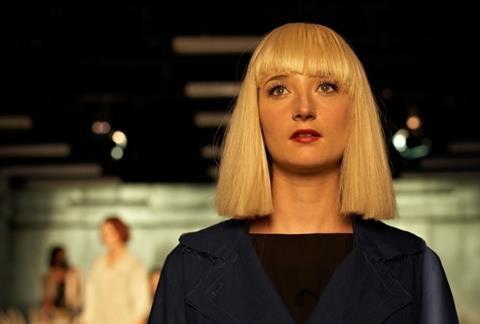Dir: Christian Schwochow. Germany. 2011. 113mins

Earnestly made but without a trace of humor, Christian Schwochow’s portrait of a young drama student who falls prey to a disturbed, Machiavellian, stage director and is almost broken into pieces in her attempt to please him, takes well established clichés and treats them with such self-important serious attention they almost begin to seem real. Almost but not quite, because the overwhelming obstacles strewn by the script on the way of innocent Josephine (Stine Fischer Christensen) before she can learn to stand on her own feet, look a bit too much like an organized steeple chase for aspiring actors both in concept and execution.
Stine Fischer Christensen gives a sincerely devoted performance as the hapless heroine victimised by her demonic director.
Solid production values and smooth technical quality may carry the picture into a modest art house career, but the ultimate feeling of overdone déjà vu will hinder further achievements. Cracks In The Shell(Die Unsichtbare) had its world premiere at the Karlovy Vary Film Festival.
Josephine, an immature, introverted 20 year-old drama student, told by her teachers she is invisible, therefore a lost case for a stage career, is picked up the next day for the lead part in a new production, despite the fact that she practically falls asleep during the audition. Obviously, the temperamental star director of the show, Kaspar Friedmann (Ulrich Noethen) has sensed she is exactly the type of brittle personality he can mold and manipulate into the creature he needs for his play.
And indeed, Josephine, who lives with her mother (Dagmar Manzel) and her brain-damaged younger sister Jule (Christine Drechsler) has more problems than she can cope with. Shy, still a virgin (the implication being it is a terrible thing to be at her age), taken for granted all her life because the handicapped sister monopolised all the care and attention, she is swept over by the old myth that art and life are separated by a thin line which the real actor has to walk all the time if he or she wishes to succeed.
Friedmann, who believes the way to get results on stage is to crush his actors until they are putty in his hands and put them back together his way, brings her to the point where her fictional identity in the play is about to take over her life and destroy it. He seduces and then humiliates her, puts her through hell, as he has promised from the very first moment. Only when she learns how to get out from under his influence and deal with her own life, can she finally go back to the stage on her own terms.
Replete with significant statements such as the one providing the title, which describes the character Josephine is supposed to play (“You only see a smooth beautiful shell but there are cracks in it, you can’t sense what’s hidden within it but it reeks of decay and death”) or her director’s attitude to actors “(“If he is not completely at the mercy of the hands that form his character, he will just stay of piece of dirt”), the script’s stentorian tone and the director’s heavy hand will leave nothing to doubt, every detail is too obviously calculated and spelled out, whether it is Josephine using again and again lines from the play not only on but off stage as well, or pretending to commit suicide before she actually attempts to do it.
Stine Fischer Christensen gives a sincerely devoted performance as the hapless heroine victimised by her demonic director, but Ulrich Noethen lacks the kind of incandescent personality that would suggest the genius behind all the moods and tantrums he throws on a regular basis.
Production company: Teamworkx Television & Film GmbH
International Sales: Bavaria Film International, www.bavaria-film.de
Producers: Jochen Laube, Fabian Maubach
Screenplay: Heidi & Christian Schwochow
Cinematography: Frank Lamm
Editor: Jens Kubler
Production designer: Kobita Syed
Music: Can Erdogan
Main cast: Stine Fischer Christensen, Ulrich Noethen, Dagmar Manzel, Christian Drechsler, Ronald Zehrfeld, Anna-Maria Muhe, Ben Kastner




















